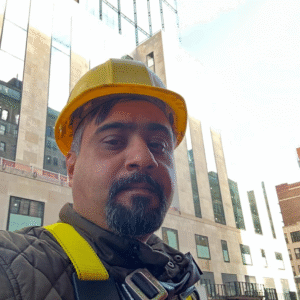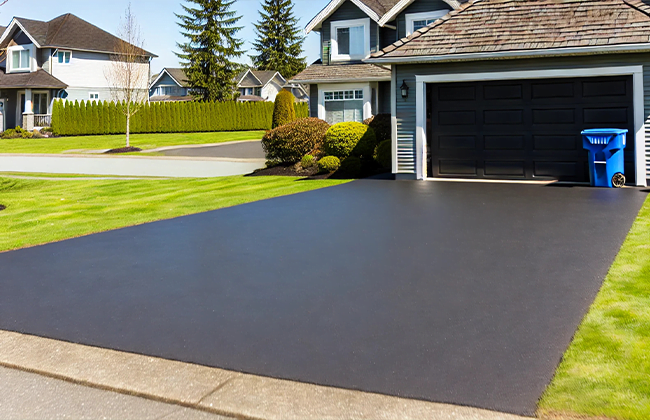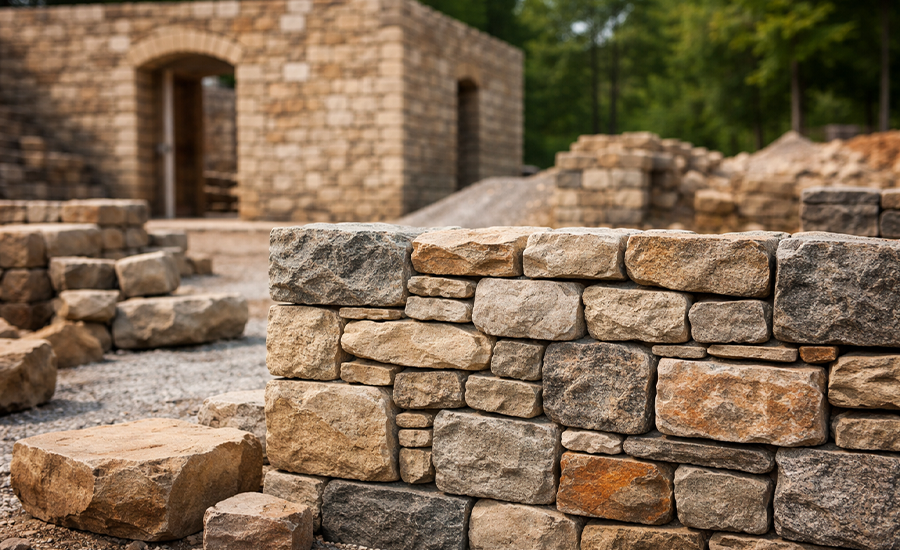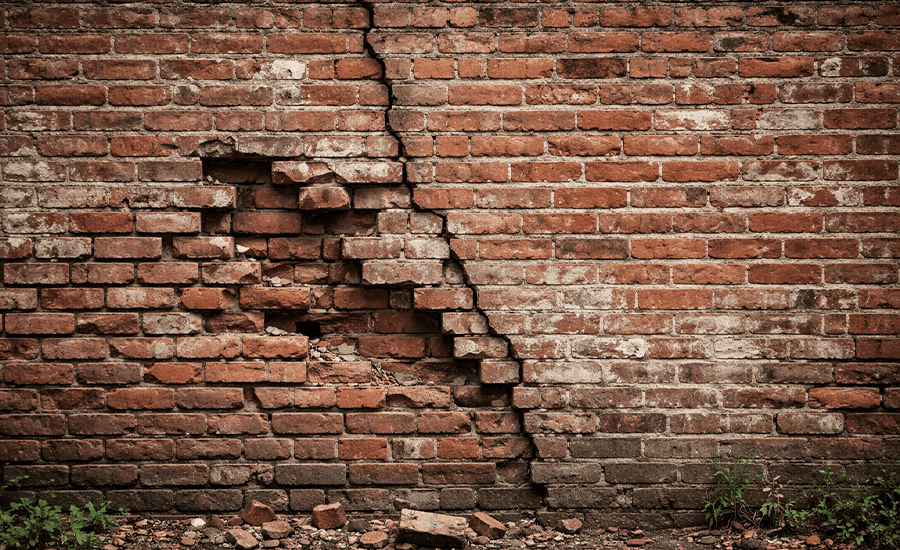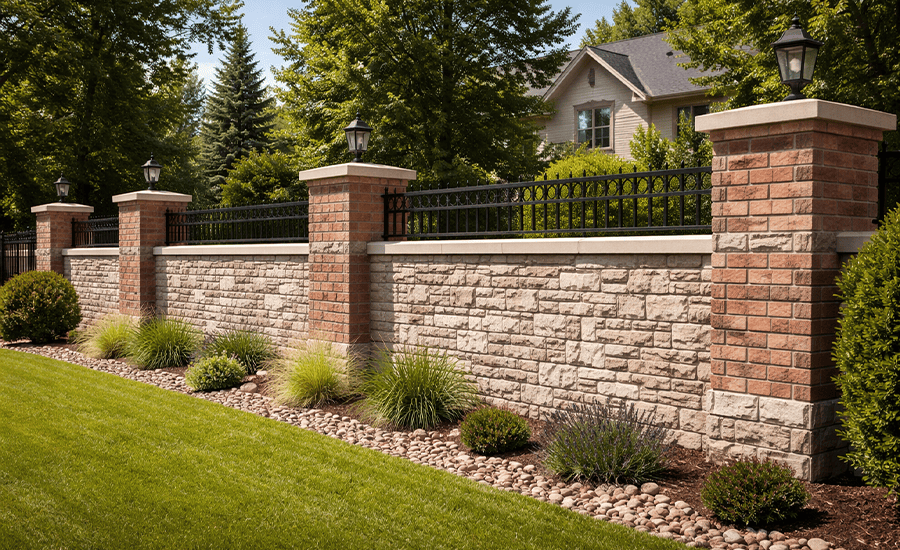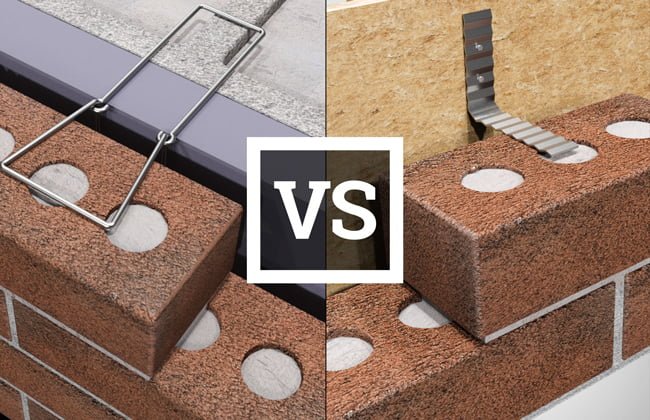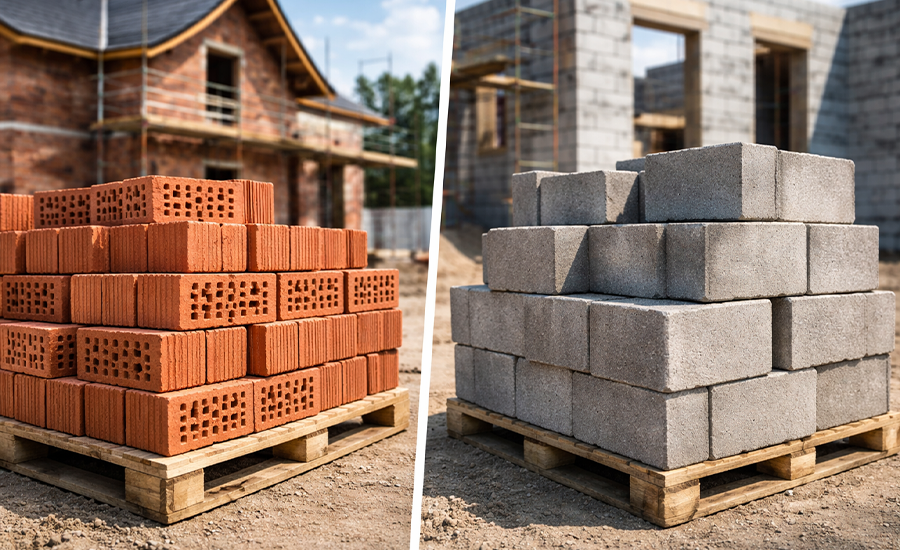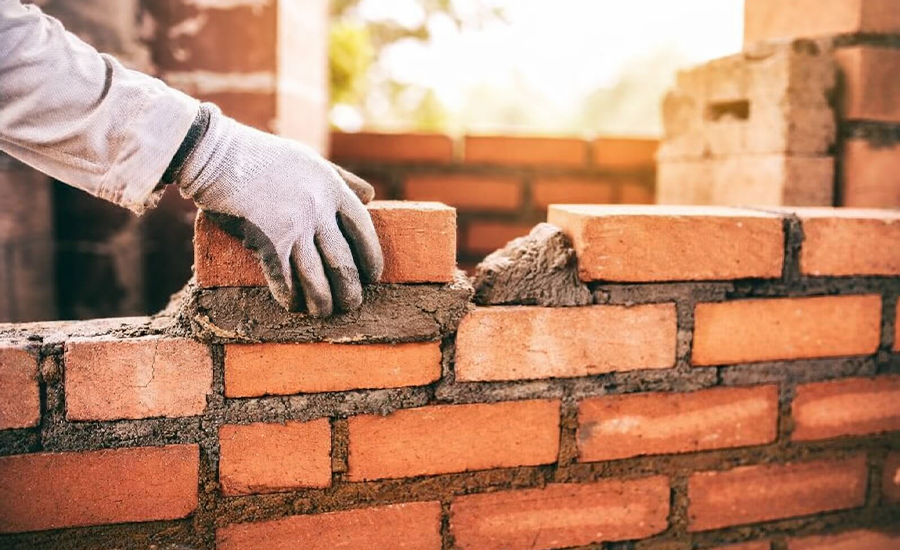When considering a new driveway, understanding the blacktop driveway cost is crucial. Blacktop driveways, also known as asphalt driveways, offer a durable and affordable solution for many homeowners. The total cost of a blacktop driveway can vary based on factors such as materials, labor, and geographical location. This article will provide you with a detailed breakdown of what to expect and how to plan for your blacktop driveway installation, helping you make informed decisions for your home.
What is a Blacktop Driveway?
A blacktop driveway, commonly referred to as an asphalt driveway, is a popular choice for its balance of cost and durability. The primary material, bitumen—a by-product of refined crude oil—serves as a robust binder. This binder is mixed with an aggregate consisting of sand, gravel, and stones, forming a durable paving material.
Blacktop is favored for several reasons. It is generally more economical than other materials like concrete, both in terms of initial materials and installation costs. The installation process can often be completed quickly, usually within a day for standard-sized driveways, which significantly reduces labor costs and overall project time.
The flexibility of blacktop is another key advantage. It can effectively accommodate shifts and movements from temperature changes or underlying soil dynamics, reducing the risk of cracks and maintenance issues. Additionally, its dark color helps melt snow and ice more quickly during the winter, easing maintenance burdens and enhancing safety.
Choosing a blacktop driveway means opting for a practical, cost-effective solution. In our next discussion, we will explore the types of blacktop driveways available, which cater to various specific needs and preferences.
Types of Blacktop Driveways
Blacktop driveways aren’t a one-size-fits-all solution; they come in various compositions and styles, each suited to different needs and environmental conditions. Let’s break down these variations to help you identify the best type for your home.
1. Hot Mix Asphalt:
The most common form of blacktop, hot mix asphalt is used predominantly in regions with cold weather. The mix is heated at a central plant before delivery to the site, ensuring it remains pliable during application. This type is prized for its durability and ability to withstand freezing and thawing without cracking.
Pros: Highly durable and relatively inexpensive.
Cons: Requires professional installation due to the need for specialized equipment.
2. Porcelain Asphalt:
A newer variant, porcelain asphalt includes recycled porcelain materials, which makes it more eco-friendly. This type is gaining popularity due to its lighter color, which doesn’t absorb as much heat in sunny climates.
Pros: Eco-friendly, reduces heat absorption.
Cons: Can be more expensive than traditional blacktop.
3. Permeable Asphalt:
This type allows water to pass through the surface into a specially prepared sub-base, reducing runoff and improving water management. It’s ideal for areas with drainage issues or for those looking to minimize environmental impact.
Pros: Excellent for drainage, reduces water runoff, eco-friendly.
Cons: Higher initial installation cost, requires regular maintenance to prevent clogging.
4. Colored Asphalt:
Asphalt doesn’t have to be black. Colored asphalt uses a pigment additive to create various hues, allowing for aesthetic customization to complement your home’s exterior or landscaping.
Pros: Aesthetic appeal, customizable.
Cons: Additional cost for coloring, potential fading over time.
Choosing the right type of blacktop driveway involves considering both the functional needs and the climate of your area. For instance, if you live in a place with heavy rainfalls, permeable asphalt might be your best bet to manage water effectively. On the other hand, in colder areas, hot mix asphalt would provide the durability needed to withstand harsh winters.
As we consider the costs associated with these different types of blacktop driveways, keep in mind that the choice you make can significantly impact both the upfront installation cost and long-term maintenance expenses. Let’s dive into the cost estimates next to better understand how much you might need to budget for each type.
Estimating Blacktop Driveway Costs
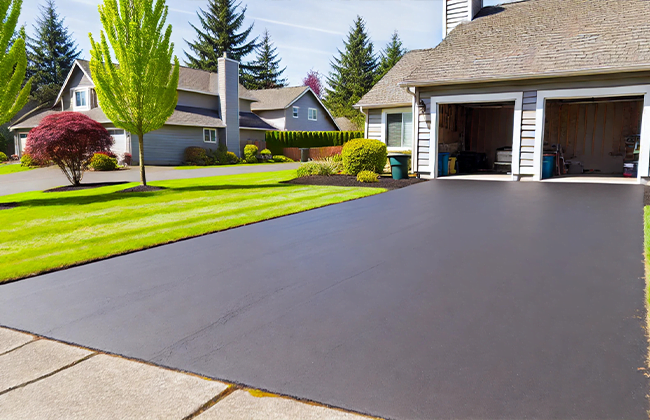
Understanding the costs associated with installing a blacktop driveway is essential for planning your budget effectively. Let’s delve into the different aspects that contribute to the overall expense.
Material Costs
Blacktop driveways are primarily priced per square foot, with the cost depending on the type of asphalt mix and the current prices of oil and aggregate. Typically, you can expect to pay between $2 and $5 per square foot for standard hot mix asphalt. Here’s a comparison to give you a better idea:
| Material | Cost per Square Foot |
| Hot Mix Asphalt | $2 – $5 |
| Concrete | $5 – $10 |
| Gravel | $1 – $3 |
The choice of material can significantly influence your initial investment. While asphalt offers a cost-effective solution, concrete, although more expensive, might offer longer longevity in certain climates.
Labor and Installation Expenses
The cost of labor for installing a blacktop driveway varies by region. On average, labor can account for 30% to 50% of the total project cost. Installation typically takes one to two days, depending on the size of the driveway and site-specific conditions.
Project Size and Design Complexity
The overall cost of your driveway project will also depend on its size and any specific design features you choose. For instance, a basic rectangular driveway will cost less than a driveway with curves or added design elements like borders or patterns. Additional features can increase costs by 10% to 20%.
Geographic Cost Factors
Prices for installing a blacktop driveway vary across different regions of the USA. Factors like local labor rates, availability of materials, and even weather conditions can affect the final cost. For instance, prices in urban areas are typically higher due to higher labor costs. Here are a few tips for finding and selecting local contractors:
- Obtain multiple quotes to compare prices.
- Check reviews and past work to assess quality.
- Ensure contractors are licensed and insured.
Understanding these cost factors can help you budget more accurately and choose the right contractor for your needs. Next, we’ll consider the pros and cons of tackling this project yourself versus hiring a professional, which can also influence your overall expenses.
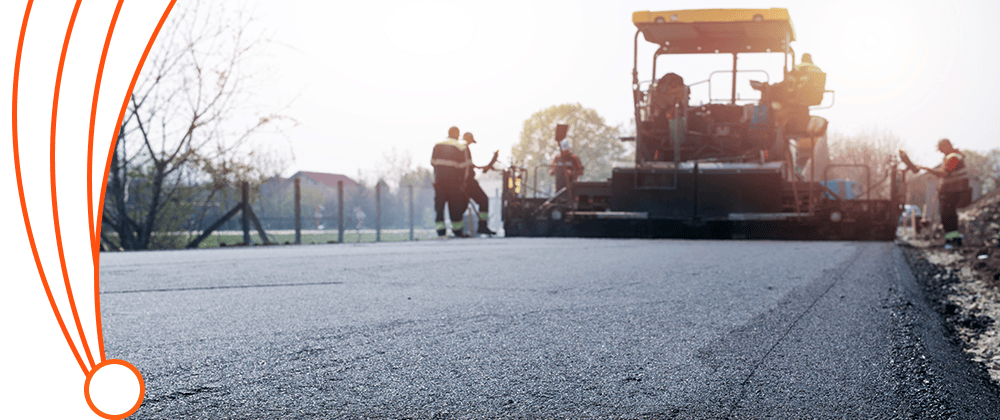
Blacktop Driveway Installation: DIY vs. Hiring a Professional
When it comes to installing a blacktop driveway, one of the major decisions is whether to take on the project yourself or to hire a professional. Both options have their merits and challenges, and the right choice depends on your skills, budget, and the outcomes you expect.
Feasibility of DIY Installation
Installing a blacktop driveway yourself can be appealing, especially if you are handy and looking to save on labor costs. DIY installation primarily involves preparing the base, which is crucial for the longevity of the driveway, and then laying down the asphalt.
Pros of DIY:
- Cost Savings: By eliminating professional labor fees, you can save significantly on the total cost.
- Flexibility: Working on your own schedule and making adjustments as needed without coordinating with a contractor.
Cons of DIY:
- Equipment Rental: You may need to rent heavy machinery, which can offset some of the savings.
- Skill Level: Properly installing a driveway requires specific skills and knowledge to ensure durability.
- Labor Intensive: The physical demand of the job can be significant, especially for larger driveways.
Professional Installation
Hiring a professional usually offers peace of mind and guarantees a certain level of quality and durability.
Pros of Hiring a Professional:
- Expertise and Experience: Professionals bring years of experience and know-how, which is crucial for a project as large and important as a driveway.
- Speed and Efficiency: A professional crew can complete the job much faster than a DIY approach.
- Long-term Reliability: Properly installed driveways last longer and may come with warranties.
Cons of Hiring a Professional:
- Higher Costs: Professional installation is more expensive due to labor and service fees.
- Less Control: You may have less control over the timing and some aspects of the project.
Comparing Costs and Outcomes
To help decide, consider the following cost comparison for a standard 20 x 20 foot driveway:
| Installation Type | Material Cost | Labor Cost | Total Cost |
| DIY | $800 | $0 (Your Labor) | $800 |
| Professional | $800 | $1000 | $1800 |
While DIY can save up to 50% of the costs, the risk of improper installation can lead to higher long-term costs due to repairs and maintenance.
If you have the necessary skills and physical capability, managing the driveway project yourself can be a cost-effective approach. However, for many, the expertise and efficiency that a professional brings can be invaluable, ensuring a durable and well-finished driveway. Moving forward, understanding the regular maintenance and longevity of blacktop driveways will further influence your decision and impact the overall value of your investment.
Maintenance and Longevity of Blacktop Driveways
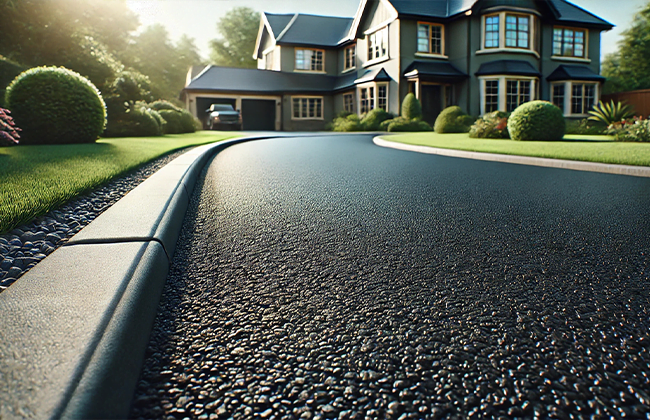
Maintaining a blacktop driveway is crucial for ensuring its longevity and keeping it looking great year after year. Here’s what you need to know about the routine maintenance requirements and the general upkeep of your driveway.
Routine Maintenance Requirements
One of the key aspects of maintaining a blacktop driveway is sealing it at appropriate intervals. Sealing not only protects the asphalt from oil spills, UV rays, and water penetration but also helps to maintain its deep black color.
Frequency of Sealing:
It’s generally recommended to seal a blacktop driveway every 2 to 3 years. However, this can vary based on the climate in your area and the level of traffic your driveway experiences. Here’s a quick look at the cost implications:
| Driveway Size | Cost of Sealing |
| Small (up to 500 sq ft) | $100 – $200 |
| Medium (500 to 1000 sq ft) | $200 – $400 |
| Large (1000+ sq ft) | $400 and up |
Essential Maintenance Tips:
- Regular Cleaning: Keep your driveway clean from debris, dirt, and spills. Regular sweeping and occasional hosing down will prevent buildup that can damage asphalt over time.
- Crack Filling: Address cracks as soon as they appear. Small cracks can be filled with a quality crack filler to prevent water from seeping in and causing further damage.
- Avoid Heavy Loads: Avoid parking heavy vehicles, like RVs or construction equipment, on your driveway as they can cause depressions and increase wear and tear.
Maintaining your blacktop driveway doesn’t just prolong its life; it also enhances the curb appeal of your property. Now that we understand the importance of regular upkeep, let’s explore how you can save on the costs of driveway installation, ensuring that your investment is not only maintained but also cost-effective from the start.

Cost-Saving Strategies for Driveway Installation
When planning for a blacktop driveway installation, it’s essential to consider strategies that can help reduce costs without compromising on quality. Here are some practical tips to help you save money on your driveway project.
Best Times of Year for Economical Installation
Timing can significantly impact the cost of your driveway installation. Contractors tend to be busiest during the peak seasons of late spring and summer, which can drive up prices. Scheduling your project during the off-peak seasons—early spring or late fall—can result in lower costs. Contractors may offer discounts during these times to keep their crews working.
| Season | Cost Implications |
| Early Spring | Potential discounts due to less demand |
| Summer | Higher costs due to peak demand |
| Late Fall | Potential savings before winter downtime |
How to Effectively Compare and Choose Contractor Quotes
Finding the right contractor at the best price involves doing some homework. Here are a few steps to ensure you get the most value for your money:
- Get Multiple Quotes: Don’t settle for the first quote you receive. Collect at least three quotes from different contractors to compare prices and services.
- Check References and Reviews: Look for reviews online and ask contractors for references. Speaking with past clients can give you insights into the contractor’s reliability and quality of work.
- Ask Detailed Questions: Make sure you understand what is included in each quote. Ask about the materials, the thickness of the asphalt, the base preparation, and any additional costs that might arise.
| Contractor | Quote | Included Services | Reviews/References |
| Contractor A | $1500 | Full installation, 2-inch base, 1-year warranty | Positive, highly recommended |
| Contractor B | $1800 | Full installation, 3-inch base, 2-year warranty | Mixed, check references |
| Contractor C | $1400 | Installation only, no base prep, no warranty | Negative, not recommended |
Identifying Possible DIY Tasks to Cut Down on Costs
While it’s often best to leave the actual laying of the asphalt to professionals, there are several tasks you can undertake yourself to save money:
- Site Preparation: Clearing the area of debris, vegetation, and leveling the ground can be done by you or with minimal hired help. This can reduce the labor costs the contractor would charge for these preparatory tasks.
- Sealing the Driveway: Once the driveway is installed, sealing it can be a manageable DIY task. Sealing every 2-3 years can be done with products available at home improvement stores, saving you the cost of hiring a professional for this routine maintenance.
By strategically planning your project timing, thoroughly vetting contractors, and taking on some of the prep work yourself, you can significantly reduce the overall cost of your blacktop driveway installation. Next, let’s consider the environmental impact of blacktop driveways and how you can make environmentally friendly choices.
Environmental Impact of Blacktop Driveways
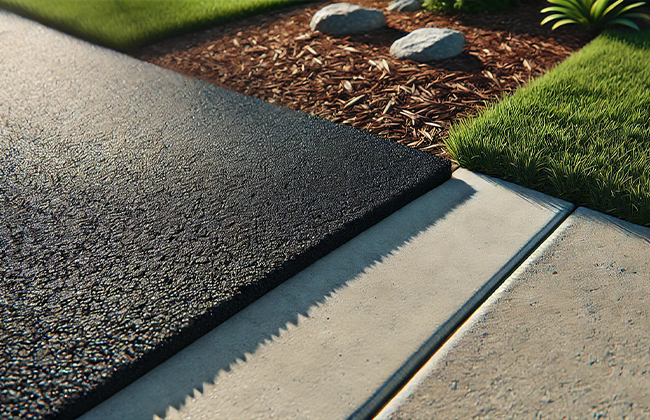
When considering a blacktop driveway, it’s important to be aware of its environmental impact. While blacktop, or asphalt, is a popular and durable choice for driveways, it has several ecological considerations that homeowners should keep in mind.
Ecological Considerations of Installing and Maintaining a Blacktop Driveway
The production and installation of blacktop driveways involve several environmental concerns:
- Energy Consumption: The production of asphalt requires significant energy, primarily because it involves heating materials to high temperatures. This energy is often derived from fossil fuels, contributing to carbon emissions.
- Runoff Pollution: Traditional blacktop is impermeable, meaning water runs off rather than seeping through. This can lead to water pollution as the runoff picks up oils and other contaminants from the driveway and carries them into local water systems.
- Urban Heat Island Effect: Blacktop absorbs and retains heat, contributing to higher temperatures in urban areas. This effect, known as the urban heat island effect, can increase cooling costs for nearby buildings and contribute to heat-related health issues.
Eco-Friendly Alternatives to Traditional Blacktop Materials
Fortunately, there are more environmentally friendly options available for those who are concerned about the impact of a traditional blacktop driveway. Here are a few alternatives:
1. Permeable Asphalt:
Permeable asphalt is designed to allow water to seep through the surface and into the ground below, reducing runoff and helping to recharge groundwater supplies. This option is great for areas with heavy rainfall or where managing stormwater runoff is a concern.
2. Recycled Asphalt:
Using recycled asphalt materials can significantly reduce the environmental footprint of a new driveway. This method involves reusing old asphalt, reducing the need for new raw materials and cutting down on energy consumption.
3. Porous Paving Stones:
These paving stones are designed to allow water to pass through, similar to permeable asphalt, but they also come in a variety of designs and colors. They can be made from recycled materials, adding to their eco-friendly appeal.
4. Cool Pavement Technologies:
These innovative materials are designed to reflect more sunlight and absorb less heat than traditional blacktop. By staying cooler, they help mitigate the urban heat island effect and can reduce cooling costs for nearby homes and buildings.
| Alternative | Benefits | Considerations |
| Permeable Asphalt | Reduces runoff, recharges groundwater | Higher initial cost, requires maintenance |
| Recycled Asphalt | Reduces environmental footprint | May not be available in all areas |
| Porous Paving Stones | Aesthetic variety, eco-friendly | Higher cost, installation complexity |
| Cool Pavement Technologies | Mitigates urban heat island effect | New technology, may be more expensive |
Choosing an eco-friendly alternative not only helps the environment but can also improve the sustainability of your home and potentially reduce long-term costs associated with runoff management and cooling.
Understanding the environmental impact of blacktop driveways and exploring alternative materials can lead to more informed and responsible choices. As we wrap up, let’s summarize the key points discussed and provide a clear path forward for your blacktop driveway project.
Conclusion
Installing a blacktop driveway is a practical and cost-effective solution for homeowners. By understanding the various aspects of blacktop driveway costs, including materials, labor, and maintenance, you can make informed decisions that suit your budget and needs. Remember to consider environmental impacts and explore eco-friendly alternatives to traditional blacktop. If you need professional assistance with your blacktop driveway, finding a reliable contractor can ensure a smooth and efficient installation. For professional blacktop driveway services, contact us at (+1) 917-355-8556.
FAQs
Q: What factors affect the blacktop driveway cost?
A: Several factors influence the blacktop driveway cost, including the price of materials, labor rates, and the size and complexity of the driveway. Additionally, geographical location can impact costs due to variations in local prices and contractor fees.
Q: How often should I seal my blacktop driveway to manage the blacktop driveway cost?
A: Sealing your blacktop driveway every 2 to 3 years can help maintain its durability and appearance, thereby managing the overall blacktop driveway cost. Regular sealing protects the surface from damage caused by weather and traffic.
Q: Is it cheaper to install a blacktop driveway myself to reduce blacktop driveway cost?
A: While DIY installation can lower the initial blacktop driveway cost, it requires significant skill and equipment. Mistakes during installation can lead to higher costs in repairs and maintenance over time. A professional may cost less in the long run.
Q: What benefits does a blacktop driveway offer despite the blacktop driveway cost?
A: Despite the blacktop driveway cost, the benefits include durability, quick installation, and ease of maintenance. Blacktop driveways also offer good performance in various weather conditions, making them a reliable choice for many homeowners.
Q: How can I reduce the blacktop driveway cost without compromising quality?
A: To reduce the blacktop driveway cost, consider scheduling installation during off-peak seasons, obtaining multiple quotes from contractors, and handling some of the preparatory work yourself. These strategies can help you save money while ensuring a high-quality driveway.
Q: What is the cheapest surface for a driveway?
A: Gravel is generally the cheapest option for driveway surfaces. It is cost-effective and easy to install. However, it may require more maintenance than other surfaces.
Q: How can I save money on blacktop driveway installation?
A: To save money, consider doing some of the preparatory work yourself, such as site clearing and grading. Also, get multiple quotes from contractors and schedule the installation during the off-peak season.
Q: Is blacktop cheaper than concrete?
A: Yes, blacktop is typically cheaper than concrete. Blacktop costs less in terms of both materials and labor. It also has a quicker installation process, reducing labor costs.
Q: Can you install asphalt over concrete?
A: Yes, you can install asphalt over concrete. People often use this method when the concrete base is still structurally sound. However, proper preparation and a good bond between the layers are crucial for durability.
Q: How thick should the blacktop be on a driveway?
A: The blacktop layer should generally be 2 to 3 inches thick. For heavier usage, such as for RVs or trucks, a thicker layer of up to 4 inches may be necessary. Proper thickness ensures durability and longevity.


